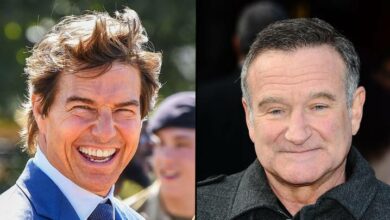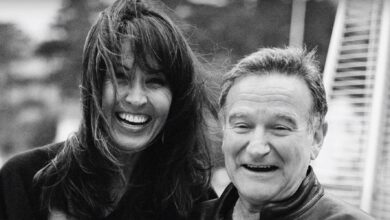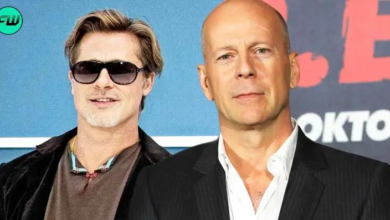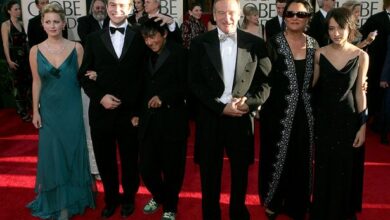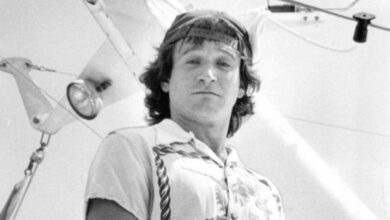Robin Williams ‘poured his heart and soul into the film,’ says widow
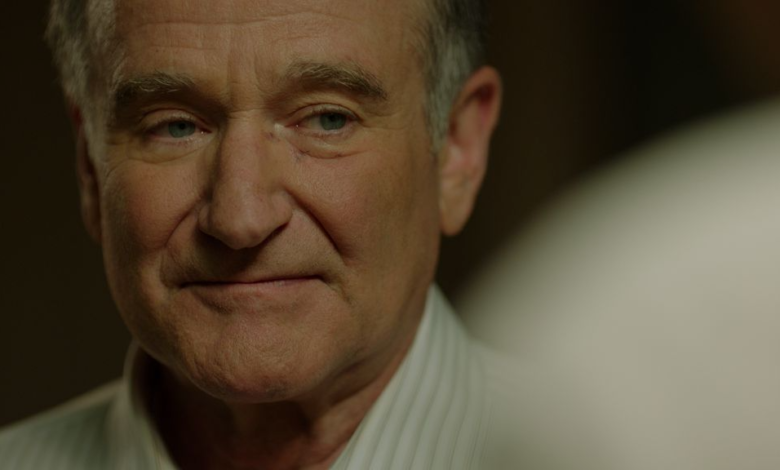
Slightly more than a year before he took his own life in August 2014, Robin Williams reported to a Nashville movie set to play a closeted gay husband battling, among other things, severe depression and a lifetime of self-deceit.
In retrospect, Williams’s Nolan Mack may be seen by some as a sad harbinger of what lay ahead.
Nolan — a shy, almost painfully withdrawn banker — is the principal character in “Boulevard,” opening in the Boston area on Friday. From all accounts, the low-budget drama was a labor of love for the actor, known to champion chancy indies, like “One Hour Photo” and “The Night Listener.” Williams suggested key changes to the script, originally set in Los Angeles and titled “Santa Monica Boulevard.” He also approved the casting and the final edit. He fought for Nolan’s intense coming-out scene (to an ailing father). It was cut, then, at Williams’s insistence, restored.
“Nolan was a more dramatic role for Robin,” said the actor’s widow, Susan. “He poured his heart and soul into the film.
“Boulevard,” promoted as Williams’s “final dramatic performance,” costars Kathy Baker as Nolan’s wife and Bob Odenkirk as his best friend. Newcomer Roberto Aguire, 27, plays a runaway-prostitute who sparks long-suppressed urges.
Fittingly, the film is “more about letting go than coming out,” said director Dito Montiel, whose “A Guide to Recognizing Your Saints” (2006) caught Williams’s attention.
“When Robin and I talked about [‘Boulevard’],” recalled Montiel, “we agreed that it was more a love story between husband and wife. How do you let go of someone you’ve been married to for 40 years? How do you say goodbye to the love of your life?”
Indeed, Williams was concerned that the film might appear to vilify Nolan’s wife, Joy (Baker), and asked for rewrites to beef up her character. “He wanted the final fight between Nolan and Joy expanded,” said the film’s screenwriter, Douglas Soesbe. “As a gay man who came out late in life, I wanted to write a story about a man who was outwardly contented but came up against a situation in which his passion just could not be contained anymore. Robin, I think, responded to that, to the humanity of the story, the simple emotional undertow.”
While some who worked with Williams on the production could not recall periods of depression or symptoms of what was later reported to be the onset of Parkinson’s disease, they said there were indications that something was troubling the actor. He appeared thinner and more introverted than usual. Also, he “really obsessed” over the smallest detail on a film that cost a small fraction of one of his studio productions, said Montiel, who often found himself, at 2 or 3 in the morning, discussing a problematic scene. “Because we shot so much at night we’d have midnight lunches. And Robin would say to me, ‘Let’s take a walk.’ So we’d walk for an hour or so trying to figure the scene out.”
Baker and Aguire chalked up the weight loss to his near-compulsive bike riding.
“I was nervous about meeting [Robin],” admitted Baker, whose credits include “Edward Scissorhands” and “Saving Mr. Banks.” “I was afraid it was going to be the funny, always ‘on’ Robin, and that he was going to be a distraction. . . . And here was this quiet . . . respectful . . . almost fragile man.
Advertisement
“But I never for a second thought he had anything physically or mentally wrong.”
Baker called Williams “a true professional” — generous to a fault. “He said after every take, ‘Did you get what you want? Do you want to do it again? You want something else?’ I wouldn’t say we did three or four takes on anything. He was totally prepared. We never stopped because he didn’t know a line.”
Susan Williams joined her husband in Nashville. Though she has yet to see the completed movie, she described her visit to the set as “incredibly moving,” adding in her e-mail, “I’ll never forget the bedroom scene when Robin got in bed quietly next to Kathy and said, ‘I love you, Joy.’ It was the most tender, touching, and sad scene.”
Seven months after principal photography had wrapped, Baker bumped into Williams again. They were in Vancouver — he was doing “Night at the Museum 3,” she was doing “The Age of Adaline.” They had dinner. He was quiet, but, as always, solicitous of fans who asked for photos or autographs. They talked about work, their families. Again, there were no signs of depression, which made what happened that much harder to fathom.
When Baker heard that Williams, suffering from acute depression, had committed suicide, she said she refused to believe it; she thought it was an Internet hoax. Once it was confirmed, she had her husband drive her to the beach, where she sat and watched the waves. “I couldn’t grasp it. I couldn’t think what to do,” she recalled. “I just wanted to go to bed or be with others who knew and loved him.”
Advertisement
If Williams had confided in her when they met in Vancouver, talked about his debilitating depression, what would she have told him?
“Oh gosh, I wonder if I would presume to say anything, other than how much I loved him and how I would want him to take care of himself,” replied Baker after a long pause. “I just can’t imagine the pain he was in. That’s the worst part — to think about the terrible pain and how he managed to hide it from people.”
“Boulevard,” promoted as Williams’s “final dramatic performance,” costars Kathy Baker as Nolan’s wife and Bob Odenkirk as his best friend. Newcomer Roberto Aguire, 27, plays a runaway-prostitute who sparks long-suppressed urges.
Fittingly, the film is “more about letting go than coming out,” said director Dito Montiel, whose “A Guide to Recognizing Your Saints” (2006) caught Williams’s attention.
“When Robin and I talked about [‘Boulevard’],” recalled Montiel, “we agreed that it was more a love story between husband and wife. How do you let go of someone you’ve been married to for 40 years? How do you say goodbye to the love of your life?”
Indeed, Williams was concerned that the film might appear to vilify Nolan’s wife, Joy (Baker), and asked for rewrites to beef up her character. “He wanted the final fight between Nolan and Joy expanded,” said the film’s screenwriter, Douglas Soesbe. “As a gay man who came out late in life, I wanted to write a story about a man who was outwardly contented but came up against a situation in which his passion just could not be contained anymore. Robin, I think, responded to that, to the humanity of the story, the simple emotional undertow.”
“Boulevard,” promoted as Williams’s “final dramatic performance,” costars Kathy Baker as Nolan’s wife and Bob Odenkirk as his best friend. Newcomer Roberto Aguire, 27, plays a runaway-prostitute who sparks long-suppressed urges.
Fittingly, the film is “more about letting go than coming out,” said director Dito Montiel, whose “A Guide to Recognizing Your Saints” (2006) caught Williams’s attention.
“When Robin and I talked about [‘Boulevard’],” recalled Montiel, “we agreed that it was more a love story between husband and wife. How do you let go of someone you’ve been married to for 40 years? How do you say goodbye to the love of your life?”
Indeed, Williams was concerned that the film might appear to vilify Nolan’s wife, Joy (Baker), and asked for rewrites to beef up her character. “He wanted the final fight between Nolan and Joy expanded,” said the film’s screenwriter, Douglas Soesbe. “As a gay man who came out late in life, I wanted to write a story about a man who was outwardly contented but came up against a situation in which his passion just could not be contained anymore. Robin, I think, responded to that, to the humanity of the story, the simple emotional undertow.”

